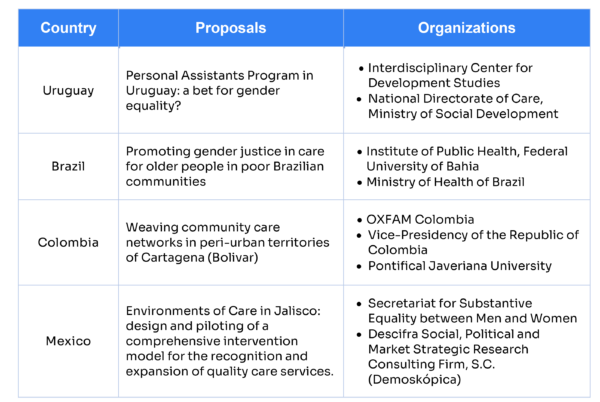[RESULTS] CALL FOR PROPOSALS: Care Economy Public Policy Innovations Collaborative Action-Research Fund Latin America and the Caribbean
The Group for the Analysis of Development (GRADE), in collaboration with United Nations Research Institute for Social Development (UNRISD) and the Global Alliance for Care, and supported by the International Development Research Centre (IDRC), launch the call for proposals for the:
Care Economy Public Policy Innovations Collaborative Action-Research Fund Latin America and the Caribbean
PRESENTATION
The care economy is in crisis and its distribution is unfair. Globally, women spend an average of 3 times more hours than men on care and domestic work. If this work were counted as part of the formal economy, it would constitute 15% of GDP in Latin America. Therefore, it is a key part of the economy, but remains unrecognized and unaccounted for.
While COVID-19 has amplified the inequalities associated with the care economy it has also opened a unique opportunityto make the care economy visible, show its importance, its lack of recognition and the gender inequalities it generates, and further the relevance to design and implement measures to address these issues.
As there is growing momentum, the project “Care Economy Partnerships for Change” (CEP4C), with the support of Canada’s IDRC, will foster collaboration with strategic partners[1] to enact change for a fairer care economy.
As part of this project, GRADE, in collaboration with UNRISD and the Global Alliance for Care, is coordinating the launch of a Collaborative Action Research Fund to provide evidence on care economy public policies innovations in Latin America.
GENERAL OBJECTIVE
To promote public (from national, regional, or local governments) care economy policy innovations in Latin America based on rigorous evidence and on collaborative work of public institutions and researchers. While we accept proposals from all government levels, proposals from subnational (local and regional) governments are particularly welcomed.
SPECIFIC OBJECTIVES
- Generate rigorous evidence to inform the implementation of public policy innovations that aim to expand the provision and foster access to quality care services and promote women economic empowerment and wellbeing.
- Provide rigorous evidence of public (subnational or subnational) innovations that aim to recognize and better retribute care work and improve women care providers (paid or unpaid) working conditions and wellbeing.
- Provide rigorous evidence of public (subnational or national) innovations (policies, campaigns, programs or programs components) oriented to change gender roles and stereotypes and redistribute work within households and communities.
REQUIREMENTS
- Public policy innovations may be led by national, regional, or local governments and may be solely public or of mixed nature in alliance with communities, civil society or private sector.
- Studies should aim to provide evidence of new proposed innovations (pilots) or innovations already implemented but with no or little insufficient evidence of results (considering various alternative evaluation methods), or additions/innovations linked to pre-existing programs/policies to foster their impact towards transforming the care economy.
- Studies include evaluating/learning on the sustainability and replicability of proposed innovations.
- Studies shall be conducted by partnerships of researchers and public sector -policy/program implementing agency (central or local governments). Ideally considering multidisciplinary teams.
SELECTION COMMITTEE
Proposals will be evaluated by a selection committee conformed by a GRADE representative, an IDRC representative, a UNRISD/GAC representative, and two external experts on policy and research care economy.
BUDGET AND DURATION
The total funding available is equivalent to 278,000 USD (or 381,000 CAD). The fund expects to support a minimum of three studies. Proposed studies may request between 30,000 and 120,000 USD, depending on the scope of the proposed study.
The budget may cover costs associated to piloting/refining of the policy innovation, personnel costs of research team, quantitative and qualitative fieldwork, travel if required, dissemination activities and other costs of the research.
Studies might have a maximum duration of 18 months.
LANGUAGE
Applications should be presented in English or Spanish.
UPDATE: EXTENDED DEADLINE
Applications may be received from February 27th to May 12th.
UPDATE: FAQ
Check out our frequently asked questions here.
UPDATE: RESULTS
GRADE appreciate the broad acceptance of the Collaborative Action-Research Fund Latin America and the Caribbean, as well as to all the more than 55 participants who submitted their proposals.
The quality and relevance of many of the proposals received made the selection process competitive and challenging. We sincerely appreciate the time invested in submitting the proposals and the interest in working to improve the care systems of the countries in the region.
According with the Fund’s Call for Proposals and following the evaluation criteria, the Evaluation Committee has determined that the awarded proposals are:

GUIDELINES
Download the detailed guidelines here.
CONTACT
Any inquiries about the call should be directed to carefund@grade.org.pe






